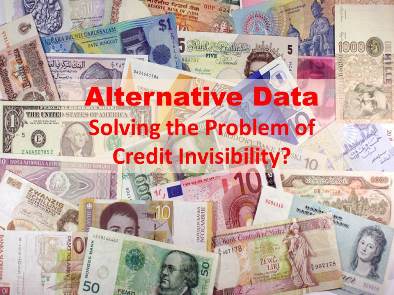 In a recent report, the Consumer Financial Protection Bureau (CFPB) estimated there that are more than 45 million “credit invisible” consumers in the US. This means that they either have no credit history or a credit file too thin to receive access to mainstream credit products. This issue is not just for those making consumer loans, as it can also impact the ability of small business lenders to extend credit to entrepreneurs with thin-files. This is especially true for sole proprietorships and partnerships, when business lenders may rely on a mix of commercial credit and the personal credit history of the small business owner.
In a recent report, the Consumer Financial Protection Bureau (CFPB) estimated there that are more than 45 million “credit invisible” consumers in the US. This means that they either have no credit history or a credit file too thin to receive access to mainstream credit products. This issue is not just for those making consumer loans, as it can also impact the ability of small business lenders to extend credit to entrepreneurs with thin-files. This is especially true for sole proprietorships and partnerships, when business lenders may rely on a mix of commercial credit and the personal credit history of the small business owner.
While credit invisibles may not have a traditional credit history, many make their cable, utility and mobile phone payments on time. However, this on-time payment data is not being included in credit files of the nationwide credit reporting agencies. Historically, telecom and utility companies have only reported instances when a consumer is behind on payments or an account has been turned over to collections. This means that credit invisibles may have negative data from telecom and utility companies in their file, but are unable to build their credit file with positive data even if they make on-time payments each month. There is a detailed track record of research showing how the inclusion of alternative data will enable millions of credit invisible American consumers who have a proven track record of meeting financial obligations to access mainstream credit. A recent study by PERC and the Brookings Institution found that when energy utility and telephone firms report timely and late payment data alike, those who are deemed credit invisible shrunk to around 5 million.
Congress has taken notice and introduced legislation to help address this discrepancy. On December 3 the Credit Access and Inclusion Act (H.R. 4172 and S.2355) was reintroduced in Congress, with Representatives Mike Fitzpatrick (R-Penn.) and Keith Ellison (D-MN) taking the lead in the House and Senators Mark Kirk (R-Ill.) and Joe Manchin (D-WVA) taking up the effort in the Senate.
The bipartisan bill would amend the Fair Credit Reporting Act to make clear that utilities, telecommunication and rental companies can report on-time payment histories and positive data to the nation’s credit reporting bureaus, rather than just late payments or collection actions that they are currently furnishing. The legislation would not require these companies to report information, but it would reassure these entities that there are no regulatory barriers to reporting on-time payment information.
Source: Experian Regulatory Roundup





















